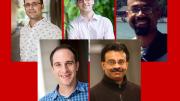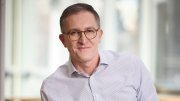Five accomplished computer scientists are among nine new hires who will join the faculty of the Harvard Paulson School of Engineering and Applied Sciences (SEAS) this fall, the school announced on August 6. SEAS has grown rapidly since its establishment in 2007, even as the number of undergraduate computer-science concentrators has increased by a factor of four. (CS 50, an introduction to computer programming, became the most popular undergraduate course at Harvard last year, with an enrollment of more than 800 students; a version will be taught this fall at Yale, too, using broadcast lectures and on-campus teaching assistants.) Applications to the school’s master’s degree program in computational science and engineering have reportedly more than doubled since its debut in 2013.
A gift from former Microsoft CEO Steve Ballmer ’77, who announced last year his aim to increase the size of Harvard’s computer-science faculty by 50 percent, enabled the arrival of the new tenured and tenure-track computer science professors. They are:
- Boaz Barak, Gordon McKay professor of computer science, formerly principal researcher at Microsoft Research New England, whose interests include all areas of theoretical computer science, especially cryptography and computational complexity. He was previously a professor at Princeton.
- Scott Kuindersma, assistant professor of engineering and computer science, a robotics specialist whose interests broadly encompass robotics, optimization, control, nonlinear systems, and machine learning.
- James Mickens, associate professor of computer science, who works on a variety of topics, including data-center-scale storage and secure computation. He formerly worked at Microsoft Research, where he focused on projects that improve the performance and robustness of client-side web applications.
- Alexander (Sasha) Rush, assistant professor of computer science, who studies and develops systems for natural-language processing, with the goal of textual understanding. His work utilizes methods from statistical machine learning and combinatorial optimization.
- Madhu Sudan, Gordon McKay professor of computer science, formerly principal researcher at Microsoft Research New England and an adjunct professor at MIT, whose research lies in the fields of computational complexity theory, algorithms and reliable communication.









